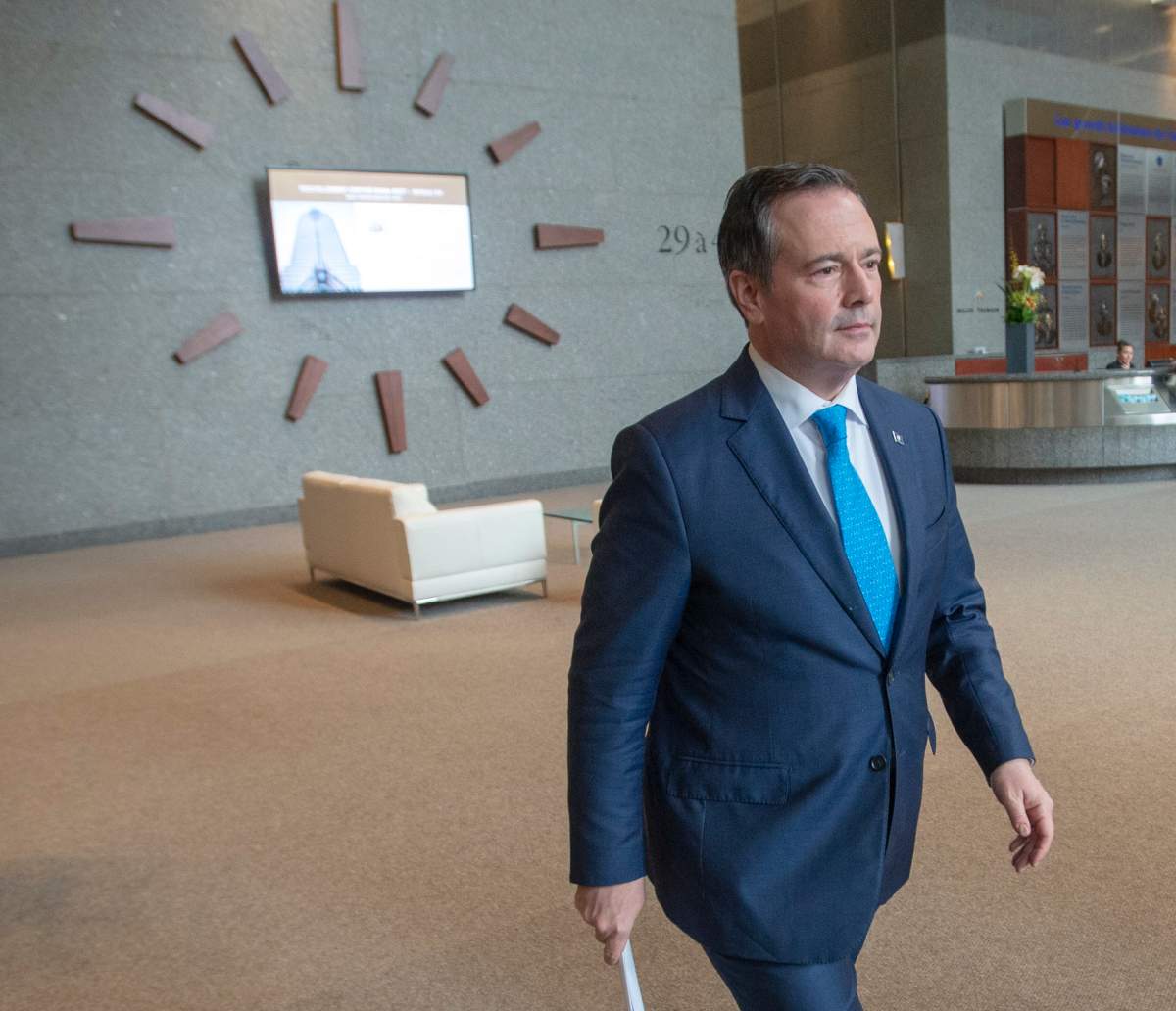Premier Jason Kenney says Alberta’s new Montreal trade office will be just one part of a renewed push in the coming months to strengthen ties and find common ground with Quebec.

“We need to understand that Quebec has a very strong preoccupation with environmental issues, and we need to communicate in those terms,” Kenney said in an interview from Washington, D.C.
“The job of our representative will be do that on a full-time basis.
“I myself will be visiting Quebec more often.
“I think one of failures around Energy East (pipeline project) was there was no Alberta leadership advocating in Quebec, so we don’t want to make that mistake a second time.”
READ MORE: Kenney calls out Quebec’s use of equalization payments after Blanchet’s meeting with Trudeau
The Quebec office was announced last week by Kenney while he was in Montreal on an eastern tour that also took him to Washington, D.C., to meet with senior government and business leaders.
He said while the new office will be in the business hub of Montreal, the representative will be spending a lot of time in Quebec City to build relationships with the government of Premier Francois Legault.
“We’ll be making an announcement (on the office) I hope in the next couple of months,” said Kenney.
“We have somebody that has agreed to the position (and) is perfectly qualified for this: an Albertan who is originally from Quebec, fluent in French and an expert in our issues.”
READ MORE: Jason Kenney should start ‘explaining things with truth,’ Blanchet says

Get breaking National news
The Energy East pipeline project, which would have taken Alberta crude through central Canada to ports and refineries in New Brunswick, was abandoned in 2017. Quebec had opposed the line through its boundaries on environmental grounds.
Alberta’s relationship with Quebec has been edgy given that Kenney has questioned Quebec’s benefiting from billions of dollars in equalization payments that grow from oil profits generated in Alberta while simultaneously opposing pipeline projects that help Alberta build that wealth.
But he said Alberta recognizes Quebec’s concerns and is determined to work with them, especially given Legault is open to Quebec boosting exports of liquefied natural gas using feedstock from Alberta.
“Premier Legault is taking a bold stance in favour of LNG exports out of Quebec, and I want to help reinforce the green message around LNG exports and the many points of co-operation we have,” said Kenney.
READ MORE: Jason Kenney, Scott Moe say tensions with Ottawa started to ease
The Energy East line was abandoned by Trans Canada while then-premier Rachel Notley’s government was in charge in Alberta.
Earlier this week, Notley, now official Opposition Leader, told reporters she made frequent trips to Quebec as premier to build support for the project.
Notley said she wants to hear more details and costs on Kenney’s proposed Quebec office but said it needs to be about building bridges and not burning them.
She said Kenney has not helped Alberta by making bellicose statements in the past and challenging Quebec’s viewpoint on energy and equalization.
“The issue is less about having an office (in Quebec), and more about perhaps not attacking every single, solitary person every time they suggest they have a different view,” said Notley.
READ MORE: Kenney takes aim at U.S. Democratic candidates who would block Keystone XL pipeline
In Washington, Kenney held a series of meetings and spoke with U.S. Secretary of the Interior Greg Bernhardt, Energy Secretary Dan Brouillette, and U.S. Trade Representative Robert Lighthizer.
He was also part of a Canadian delegation of premiers and Deputy Prime Minister Chrystia Freeland.
Kenney said he worked to overcome concerns with the Keystone XL line, which now has a presidential permit and would take more Alberta oil to terminals and refineries on the Gulf Coast.
He said Keystone XL is one of a number of pipeline projects facing some resistance, along with the Line 3 replacement project and Line 5 in the U.S. upper Midwest.
“We’re facing a lot of friction and even hostility,” said Kenney, but said the message from the U.S. government and Congress is encouraging.
“We’re getting a sympathetic ear.
“Washington understands national security. It’s a bipartisan preoccupation, and they understand that energy security is a key part of that.
“There are some voices against Canadian energy here, but I think they’re really at the margins.”
WATCH BELOW (Dec. 12, 2019) : A new forecast shows Alberta’s economy in 2020 will likely look quite similar to what we saw this year.







Comments
Want to discuss? Please read our Commenting Policy first.